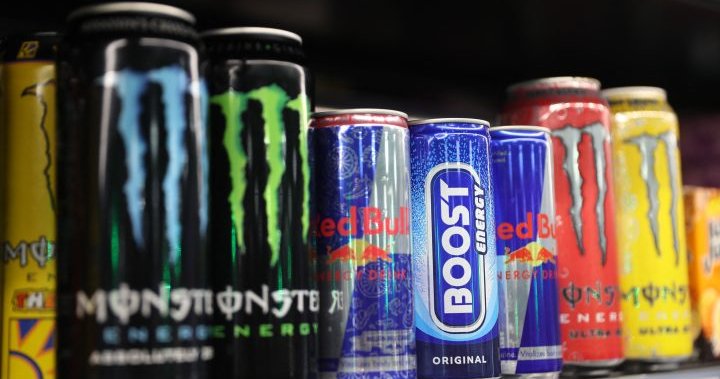Canada is facing a growing concern over the accessibility of energy drinks and their potential impact on young people as more of these products are being recalled due to high levels of caffeine. Pediatricians and health experts are voicing their worries about the widespread availability of energy drinks and the lack of control over their distribution, especially to individuals under the age of 18. While some energy drinks come with warnings that they are not recommended for minors, they are not regulated in the same way as alcohol or cannabis.
Health experts warn that the high caffeine content in energy drinks can lead to various health issues, particularly in children and teenagers who may consume multiple drinks at once. Dr. Anna Banerji, an associate professor of pediatrics, compares the caffeine intake from energy drinks to consuming six to eight cups of coffee, emphasizing that such levels are not sustainable. Withdrawal symptoms from caffeine, such as sleep disturbances, irritability, nervousness, and anxiety, can occur when individuals suddenly stop drinking energy drinks.
Headaches, nausea, irregular heartbeat, and insomnia are among the side effects associated with consuming energy drinks, according to HealthLink BC. Additionally, these beverages often contain high levels of sugar and provide little nutritional value, leading to empty calories. The caffeine content in energy drinks varies by brand, with popular ones like Red Bull and Monster containing around 80-160 milligrams of caffeine per serving, equivalent to a cup of home-brewed coffee. However, some energy drinks have been found to contain 300 milligrams or more of caffeine.
In the United States, the Food and Drug Administration advises adults to limit their caffeine intake to approximately 400 milligrams per day. Although there is no specific recommendation for individuals under 18, the American Academy of Pediatrics discourages caffeine consumption in this age group. In Canada, Health Canada advises children and adolescents to limit their caffeine intake to 2.5 milligrams per kilogram of body weight per day. For example, the recommended daily caffeine intake for an average 16-year-old weighing 60 kilograms would be no more than 150 milligrams.
Dr. Jean-Philippe Chaput, a senior scientist, highlights the need for young people to focus on drinking healthy beverages like water instead of relying on caffeine and energy drinks to stay alert. Lack of sleep is a prevalent issue among Canadian youth, with almost one-third of school-aged children not getting enough sleep. Chaput suggests a combination of education and new policies as a potential solution, encouraging parents, schools, and healthcare providers to address proper sleep habits and discourage energy drink consumption. Consistency in messaging is vital, with everyone emphasizing that energy drinks are not beneficial.
Chaput also proposes further restrictions on the caffeine content in energy drinks as a policy option. However, Banerji raises concerns about the feasibility of implementing such measures, stating that restrictions on energy drinks are not comparable to those on items like tobacco due to their unique nature. She also criticizes the marketing techniques employed by energy drink companies, arguing that despite claims that their products are intended for adults, they are heavily marketed towards young people through bold logos and vibrant packaging.
Marvin Ryder, an associate professor of marketing, notes the influence of social media as a marketing tool for energy drink makers. Peer-to-peer communication on platforms like social media can have a more significant impact on young people than formal advertising from the companies. Ryder believes that significant changes are unlikely without government intervention, suggesting that warning labels could be made more prominent, colors and logos altered or removed, or changes made to the way these products are sold.
Recently, Canada issued recalls for six energy drink brands, including Logan Paul and KSI’s Prime Energy, as well as the well-known 5 Hour Energy. These recalls were due to concerns about excessive caffeine levels and labeling issues. Ryder emphasizes the importance of enforcing such regulations, urging for the strict removal and destruction of any products that violate Canadian rules.
Denial of responsibility! VigourTimes is an automatic aggregator of Global media. In each content, the hyperlink to the primary source is specified. All trademarks belong to their rightful owners, and all materials to their authors. For any complaint, please reach us at – [email protected]. We will take necessary action within 24 hours.


